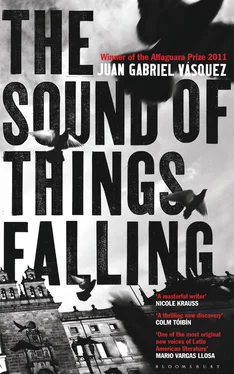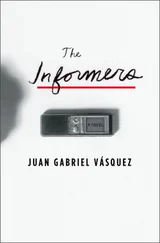She had no way of knowing just how mistaken she was.
5. What’s There to Live For?
Elaine would remember those last three weeks in Bogotá and in Ricardo Laverde’s company the way one remembers the days of one’s childhood, a cloud of images distorted by emotions, a promiscuous mixture of key dates without a well-established chronology. The return to the routine of classes at the CEUCA — there were very few left now, just a matter of refining certain bits of knowledge or perhaps justifying certain bits of bureaucracy — was broken by the disorder of her encounters with Ricardo, who might perfectly well be waiting for her behind a eucalyptus when she was on her way home or might have slipped a note into her book telling her to meet him at a dingy café at the corner of 17th and 8th. Elaine always showed up for these dates, and in the relative solitude of downtown cafés the two of them cast more or less lascivious glances at each other and then went into a cinema to sit in the back row and touch each other under a long black coat that had belonged to Ricardo’s grandfather, the aviator hero of the war with Peru. Indoors, in the narrow house in Chapinero, in Don Julio and Doña Gloria’s territory, they carried on the fiction that he was the son of the host family and she, the innocent apprentice of the moment; the son’s nocturnal visits to the apprentice carried on as well, of course, with their silent nocturnal orgasms. So they began to live a double life, a life of clandestine lovers who didn’t arouse anyone’s suspicion, a life in which Ricardo Laverde was Dustin Hoffman in The Graduate and Miss Fritts was Mrs Robinson and her daughter at the same time, who was also called Elaine: that must mean something, wasn’t it too much of a coincidence? During those few days in Bogotá, Elaine and Ricardo protested against the Vietnam War whenever a demonstration was called, and also attended parties organized by the American community in Bogotá, social events that seemed arranged deliberately so the volunteers could go back to talking their own language, ask out loud how the Mets or the Vikings were doing or take out a guitar and sing, all together and around a fireplace while passing a joint that was finished in two rounds, Frank Zappa’s song:
What’s there to live for?
Who needs the Peace Corps?
The three weeks ended on 1 November, when, at eight thirty in the morning, a new litter of apprentices swore loyalty to the statutes of the Peace Corps, after more promises and a vague declaration of intentions, and received their official appointment as volunteers. It was a rainy cold morning, and Ricardo was wearing a leather jacket that, upon contact with the rain, began to give off an intense smell. ‘They were all there,’ Elaine wrote to her grandparents. ‘Among those graduating were Dale Cartwright and the son of the Wallaces (the elder one, you remember). Among the audience were the Ambassador’s wife and a tall man in a tie who, I seem to have understood, is an important Democrat from Boston.’ Elaine also mentioned the deputy director of Peace Corps Colombia (his Kissinger glasses, his knitted tie), the directors of the CEUCA and even a bored municipal functionary, but at no point in the letter did Ricardo Laverde appear. Which, seen with years’ worth of distance, is nothing short of ironic, for on that very night, under the pretext of congratulating her and at the same time saying farewell in the name of the whole Laverde family, Ricardo invited her to dinner at the Gato Negro restaurant, and by the light of some precarious candles that threatened to topple into the plates of food, taking advantage of a silence when the string trio finished singing ‘Pueblito Viejo’, knelt in the middle of the aisle where the bow-tied waiters kept walking up and down and in more sentences than strictly necessary asked her to marry him. In a flash, Elaine thought of her grandparents, regretted that they were so far away and that at their age and in their states of health even considering the trip would be impossible, felt the kind of sadness we tolerate because it appears at happy moments and, once the sadness passed, bent down to kiss Ricardo hard. As she did so she inhaled the wet leather smell of his jacket and tasted meunière sauce. ‘Does that mean yes?’ said Ricardo after the kiss, still kneeling and still in the waiters’ way. Elaine burst into tears in reply, but smiling and crying at the same time. ‘Of course,’ she said. ‘What a stupid question.’
So Elaine had to delay her departure for La Dorada by fifteen days, and in this cruelly short time organized, with the help of her future mother-in-law (after convincing her that no, she wasn’t pregnant), a small and almost clandestine wedding in San Francisco Church. Elaine had liked this church since the beginning of her life in Bogotá. She liked its thick, damp stone walls, and she also liked going in off the street and coming out onto the avenue, that violent clash of light with darkness and noise with silence. The day before her wedding, Elaine went for a walk through the centre (a reconnaissance mission, Ricardo would say); as she crossed the threshold of the church, she thought of the silence and noise and the darkness and light, and the illuminated altar caught her eye. The place seemed familiar to her that day, not as if she’d been there before, but in a more profound or private way, as if she’d read a description of it in a novel. She stared at the timid flames of the candles, at the weak yellow lamps fastened like torches to the columns. The light of the stained-glass windows lit up two beggars who were sleeping with legs crossed and hands together on top of their bellies like marble tombs of popes. To her right, a life-sized Christ on all fours, as if he were crawling; the day pouring in through the other door struck him full in the face, and the thorns of his crown and the drops of emerald green that the Christ was crying or perspiring glistened in the light. Elaine went on, walked along the left aisle towards the set-in altar at the far end, and then she saw the cage. In it, enclosed like an animal on show, there was a second Christ, with longer hair, yellower skin, darker blood. ‘It’s the best in Bogotá,’ Ricardo had told her once. ‘I swear, Monserrate’s got nothing on this.’ Elaine bent down, read the little plaque: Señor de la agonía . She took two more steps towards the pulpit, found the tin box and another inscription: Deposit your offering here and the image will be illuminated. She put her hand in her pocket, found a coin and lifted it in two fingers, as if it were a host, to let there be light: it was one peso, the coat of arms blackened as if the coin had been through fire. She dropped it into the slot. The Christ figure came to life beneath the brief blast of the spotlights. Elaine felt, or rather knew, that she was going to be happy all her life.
Then came the reception, which Elaine went through in a fog, as if it were all happening to someone else. The Laverde family held it in their house: Doña Gloria explained to Elaine that it had been impossible, at such short notice, to rent the hall of a social club or some other decent place, but Ricardo, who listened to the laborious explanation in silence, nodding, waited until his mother had gone to tell Elaine the truth. ‘They’re fucked for money,’ he said. ‘The Laverdes have pawned their whole lives.’ The revelation shocked Elaine less than she might have expected: a thousand different signals over the last few months had prepared her for it. But she was struck by Ricardo referring to his family in the third person, as if their bankruptcy didn’t affect him. ‘And us?’ asked Elaine. ‘What about us?’ ‘What are we going to do?’ said Elaine. ‘My work doesn’t pay very much.’ Ricardo looked her in the eye, put a hand on her forehead as if she might have a temperature. ‘It’s enough for a little while,’ he said, ‘and then we’ll see. If I were you I wouldn’t worry.’ Elaine thought for a second, and found she wasn’t worried. And she wondered why not. And then she asked him, ‘Why wouldn’t you be worried if you were me?’ ‘Because a pilot like me is never going to be short of work, Elena Fritts. It’s a fact and that’s just how it is.’
Читать дальше












